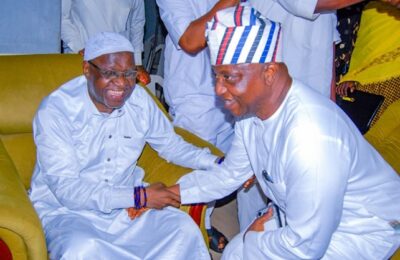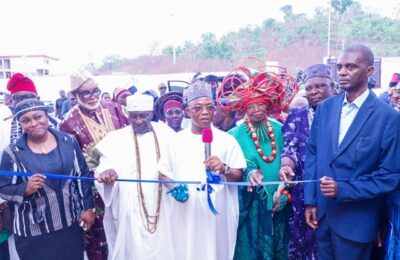In Nigeria, the death of a common man rarely breaks the silence. He dies not in battle, but in the bureaucracy of broken systems. His life ends not because God called him home, but because his nation denied him help. His obituary is written not with pens, but with policies that never saw him. As Archbishop Benson Idahosa once thundered, “My God is not poor; poverty is a curse, not a virtue.” But in Nigeria, it is the poor who carry the heaviest cross — without Simon to help, without even Golgotha to name.
The death and burial of the Nigerian common man is not a tragedy; it is a tradition. A silent routine. A ritualized abandonment. From birth, he is offered no covenant of care. No covenant of provision. Only unending negotiations for survival. In schools where chalk is a luxury. In hospitals where the drip is dry. In courtrooms where justice is reserved for the eloquent and connected. The Holy Bible asks in Proverbs 29:7, “The righteous considers the cause of the poor, but the wicked does not understand such knowledge.” Nigeria’s elite, like Pharaoh, have hardened their hearts.
The poor man’s breath is spent on queues: for petrol, for PVCs, for food. His legs are worn thin by political rallies, his ears bruised by campaign lies. Yet, when the harvest comes, he is excluded from the banquet. He is Lazarus by the gate — only in this Nigerian parable, even the crumbs are swept away. Bishop David Oyedepo warned: “Any government that ignores the welfare of the masses is working against divine order.” The divine blueprint places the weak in the centre — not the margins.
In this land of rituals without results, I have seen what most only hear in whispers. I am an eyewitness. The poor man’s death here is not final — it is recycled. One such man collapsed in the street. Several Ifa priests/herbalists would be called to chant, invoke, burning herbs. Nothing
Then a mallam would be invited. He whispered Arabic supplications into the man’s ears and burn incense to drive away demons and water spirits — still silence. In desperation, a Pastor arrived, He knelt beside him, poured oil, shouted hallelujah!!! Finally, the man stirred. He blinked. They rejoiced. He had ‘risen’.
But he rose to hell.
He came back not to health, but to hunger. Not to peace, but paralysis. He could not talk. He could not eat. He could not pay a hospital bill. He came back to continue dying — but slower. His resurrection became a new sentence, not salvation.
And this — this unholy resurrection — has become a metaphor for Nigerian poverty: we keep people barely alive, just to continue watching them suffer. In our superstition and our fear of death, we ignore the deeper tragedy: the fact that some lives are worse than death. As Pastor Chris Oyakhilome rightly said, “The greatest failure of a nation is not economic collapse, but the death of conscience.”
In a nation overflowing with pulpits but starving in principle, the common man remains the eternal casualty. Jesus said in Matthew 25:45, “Whatever you did not do for one of the least of these, you did not do for me.” Yet in Nigeria, we build cathedrals while beggars lie outside their shadows. We hold revival services for the mighty, but forget that heaven celebrates the cup of water given to the thirsty. You wouldn’t blame the churches because God has given us all we need to excel as a nation. Sadly, these blessings have being hijacked by individuals who claimed to be our leaders.
The essence of religion, as Apostle Ayo Babalola preached, is not noise but compassion — not tongues, but tears for the broken.
When the poor man dies, there are no flags at half-mast. No national mourning. Only his widow and her hungry children. No tribute from senators. No inquiry from the press. We cannot claim to love God whom we do not see, if we do not love the people we see. Africa value your own” says T.B Joshua. Why do we value visibility as power in this country? The invisible die unnoticed. And those in power act like Saul — present but absent, armoured but clueless, chosen but disobedient.
As Sam Adeyemi often teaches, “Leadership is stewardship. It is responsibility to the people, not dominion over them.” But the Nigerian political class leads with arrogance and legislates without conscience. While billions are budgeted for security votes, villagers sleep with one eye open. While lawmakers fight over chairmanships, children die from malaria in government clinics. The poor are not numbers; they are names — known to God, forgotten by man.
A Yoruba proverb declares, “The death that kills one’s relative teaches wisdom.” Yet Nigeria remains unteachable. The death of the poor man has taught nothing. He has died in herdsmen attacks. In police brutality. In flooding. In childbirth. In prison cells. In silence. And still, we normalize it. This is not done in any working democracy in the world. Still, we preach peace while denying equity. Still, we bury the innocent and promote their oppressors. The Book of James is thunderous on this: “The cries of the labourers whom you cheated have reached the ears of the Lord of Hosts.” (James 5:4)
The poor man is not poor because he lacks wisdom. He is poor because the ladder was pulled up. The system is not broken — it was designed this way. Designed to protect privilege and punish poverty. Designed to elevate the connected and humiliate the committed. The cry of Nigeria’s streets is not against fate; it is against injustice. Against wickedness dressed in agbada and crowned with sirens.
In the words of Pastor Chris Oyakhilome again, “When we don’t speak up for the voiceless, we are lending our silence to the oppressor.” The pulpit must roar again — not just in prayer, but in prophecy. Not only to heal the sick but to confront the unjust. For what is holiness if it ignores hunger? What is anointing if it avoids advocacy?
A nation where the poor man’s death is a footnote is a nation approaching judgment. For God’s scorecard is not based on GDP or airports, but on “How did you treat the least of these?” (Matthew 25:40). Nigeria may boast its oil, its music, and its megachurches. But God is listening for justice. He is searching for righteousness that rolls down like a river (Amos 5:24).
Until the nation repents from apathy, and our leaders stop hiding behind protocol to avoid responsibility, the land will groan. “Woe to those who make unjust laws,” says Isaiah 10:1, “to those who issue oppressive decrees.” The blood of the common man cries from the soil. Like Abel’s blood, it indicts the system. Like Stephen’s, it demands response from heaven.
So let us not weep only at his burial. Let us repent at his story. Let us refuse the culture that buries the truth with the body. The poor man may have died, but his death must awaken the conscience of a nation that has forgotten that power is for service, not show.
Because until the Nigerian common man lives with dignity, we all remain prisoners — of a lie, of a legacy of injustice, of a democracy stripped of mercy. Let the Church arise. Let the thinkers speak. Let the citizens act. Let heaven find a reason to smile over Nigeria again.
And maybe, just maybe, the next poor man will live — and not die — in vain.
– Inah Boniface Ocholi writes from Ayah – Igalamela/Odolu LGA, Kogi state.
08152094428 (SMS Only)




